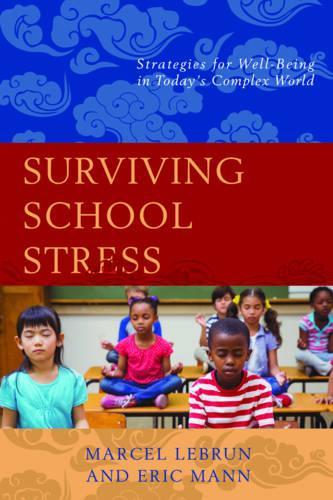
Surviving School Stress: Strategies for Well-Being in Today's Complex World
(Paperback)
Available Formats
Publishing Details
Surviving School Stress: Strategies for Well-Being in Today's Complex World
By (Author) Marcel Lebrun
Contributions by Eric Mann
Bloomsbury Publishing PLC
Rowman & Littlefield Publishers
12th October 2016
United States
Classifications
Professional and Scholarly
Non Fiction
Teaching staff / Educators
Teaching skills and techniques
Coping with / advice about stress and stress-related issues or topics
371.4
Physical Properties
Paperback
174
Width 157mm, Height 235mm, Spine 10mm
245g
Description
Surviving School Stress provides the reader with fundamental components of different types of stress, stressors, and strategies for interventions. In Part I, Dr. Lebrun breaks down the individual components of each type of stress and provides readers with a clear understanding of the key concepts and essential questions needed to be able to effectively intervene with children and adolescents within a school or home setting.
Part II of the book provides a framework for educators to use to guide small and large group lessons in a school setting. Each lesson can be individually presented. The small group lessons are meant to guide students in a very focused direction. The general classroom lessons can be adapted depending on the needs of the group within that particular classroom. This resource is suitable for all special education teachers, general classroom teachers at the K-12 levels, behavior consultants, and school mental health counselors.
Reviews
I like how easy the curriculum is to present. I dont have time in my schedule to create a thoughtful curriculum. This includes everything I need; logically organized, step by step.
The checklists early in the program allow students to reflect and have a deeper understanding of their values and stressors without the added anxiety of having to share out in a group they may not trust yet. Later, when students have grown to trust the group, they are able to share personal thoughts and feelings, making the experience powerful for all of them.
It's great to have found a curriculum that students of all ages can really buy into! Students are taking charge of their choices and goals! -- Jessica Gervais, program director, John Powers School - Alternative school Grades 1-9, Somersworth, New Hampshire
One very simple aspect of MS3 that I like is the use of the word 'stress.' Kids and adults alike can relate to this word! -- Ben Nester, school psychologist, South Meadow Middle School, Peterborough, NH
I think this curriculum has helped students identify what they do and feel, and gives it a name. Students are starting to identify on their own some goal supporting and goal defeating behavior. They explain how they can turn negative self-talk around to positive self-talk. They are starting to identify their stress and what they can do about it. -- Paula Rounds, 5th grade teacher, South Meadow Middle School, Peterborough, NH
I am going to be starting session 9 next week. So far it has been great. I combined session 1 and 2 and had students go through their own surveys and summarize it themselves. This was great because they could reflect on themselves. We had great discussions regarding this. Overall this has been a great program with wonderful information. -- Sara Cox, 7th grade science and math teacher, South Meadow Middle School, Peterborough, NH
Many of the activities have opened up discussion about stressors teens can experience. Even students that may not be verbally sharing are listening to the conversation. I believe it helps them to know that they are not the only ones experiencing these things. -- Cindy Bradshaw, South Meadow Middle School, Peterborough
We have had much success with the Managing Stress curriculum. Our students check in each morning and have been able to, over time, see the link between a good night of sleep, breakfast, talking about their stress and having a good day. Many times, students will link their weekly goals to the areas on their morning check in that seem to be troublesome (going to bed at the same time each night, having breakfast or simply asking to stay with us during advisory).
The learning and language allows us (adults) to assess student needs before they become so big that the kids get overwhelmed and shut down. They have all noted to us as well that they like to be able to talk about little things before they become bigger issues.
I have implemented the curriculum with a middle school group and a high school group. In both groups the vocabulary of persistence, resilience and dwelling have been an awesome tool, both when processing in group and in individual counseling. In both groups we were able to have rich discussions from the initial Managing Stress Survey. -- Sue Cohen, counselor for Rochester Learning Academy, Rochester, NH
I trialed the Managing Stress Curriculum with a class of nine middle school students that have emotional and behavioral disabilities. The lessons were engaging and easily adapted towards the various needs of the students. The students could relate to the topics discussed and appreciated the time spent on issues they experience on a daily basis. It was a meaningful experience for the staff in the classroom, as well, and encouraged open and honest communication and understanding. -- Sherry Farida, Spaulding Youth Center, Northfield NH
Author Bio
Marcel Lebrun is a professor at Plymouth State University in New Hampshire with 36 years of experience in education. He has published 12 books, numerous articles, and has presented throughout the world on issues in special education, ethical leadership and advocacy, social justice and mental health issues in students. He has traveled extensively and visited 87 countries worldwide in his quest to bring awareness and strategies of mental health issues to the school system and society as a whole.
Eric Mann is a consultant at SERESC. He consults in the areas of Positive Behavior Interventions and a long time social worker.
